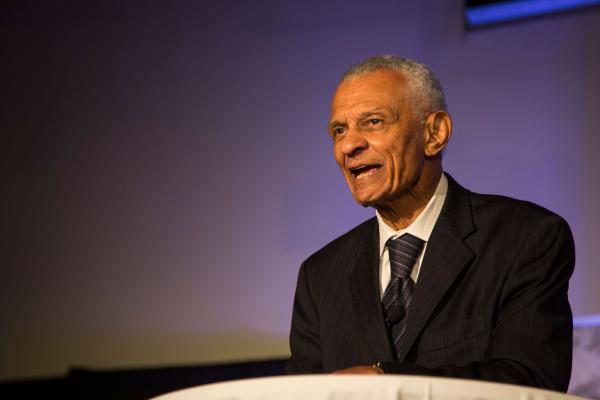The Rev. C.T. Vivian was a civil rights leader and ordained pastor who never stopped fighting for justice; throughout his life, he believed that his work was inspired, guided, and sustained by God.
When Vivian passed on July 17 in the early morning – to be followed in death later that evening by fellow civil rights veteran Rep. John Lewis, the earth moaned, as did many people who loved both men and the work they did.
While researching C.T. Vivian’s life, I had the honor of sitting with Vivian for hours, hearing about his life and work, including how he trained and organized people in nonviolent direct action before the height of the civil rights movement of the ’60s. But what I found so striking in the stories he shared with me was his belief that the movement – and everything that he and others did in it – was spiritual.
“I’m serious about the religious side of this,” said Vivian, who studied at American Baptist College and served as the pastor of Historic First Community Church in Nashville.
“Everything we did in the movement was spiritual; that’s why it was nonviolent,” he said. “I don’t remember a time in my life where the religious part of my existence did not play a major role in everything I did.”
Vivian shared that as a child, he loved going to church. He would go with his grandmother, but sometimes his mother did not want him to go. Whenever that happened, he recalled, he was very sad. He described one Sunday when he had gotten dressed for church, but his mother decided he would not go. Mortified, he ran out of the house, and said he lay down in a rut close to the street to “let the cars run over me.” His grandmother saw him lying there, sent him into the house, and took him to church with her. His mother never forbade him to go to church with his grandmother again.
He always felt God with him, he said. “Several times I was close to death, but God intervened,” he said, recalling how, in a 1964 “wade-in” protest at segregated beaches in St. Augustine, Fla., they were met by angry white mobs. “Before I knew it, I was in the water, and I knew I was in trouble because I couldn’t swim.”
One member of the mob got to him and pushed his head under the water. Terrified, Vivian said he believed that he was going to die that day, but “a police officer was there and pulled the attacker off me.” Vivian said he saw the officer for a second after he was able to stand up but when he looked around, the officer was gone. “I never saw him again.”
Vivian came from a family of people who believed in God and in justice. He described how his great-great grandfather escaped from the plantation on which he had worked for years to join the Union Army during the Civil War. Vivian recalled how his great-great grandfather was fiercely proud and never took the name of his owner. “After slavery, we placed ourselves in the world by choosing our own names,” said Vivian. They believed that God was with them as they faced almost certain retribution for doing things their way.
My friend was one of the original 1961 “Freedom Riders,” riding on the buses with them through the South, singing, praying, and working to bore a hole through the system of white supremacy. By this time, the sit-in movement had overtaken the country. Young kids were excited about participating in the Freedom Rides, despite the violence they were sure to meet. Vivian said that it was at that time that he realized “you can’t let violence stop the movement.”
But his sense of God’s presence was also heightened during that time.
He recalled how the bus full of Freedom Riders stopped in Jackson, Miss., so that the youth could go to the bathroom. As they got off the bus, they were all arrested, including Vivian. They were taken to the Jackson City Jail and were there for about a week before being transferred to Parchman Prison. While in Parchman, Vivian was beaten with a belt that had sharp steel spikes. Vivian recalled the pain that came with each blow that ripped his skin to what felt like to the bone.
But then, suddenly, the beating stopped. Vivian, bleeding profusely, was taken back to his cell by a guard who held a .38 pistol to the back of his head. Vivian, feeling something on the back of his neck, turned around and stared the guard in the eye – something Black people were not supposed to do. “I don’t know why I did that,” he said, but the guard looked as though he was trying to decide whether to shoot Vivian – and then, suddenly, dropped the gun and walked away.
One of the Freedom Riders, a white youth, was released on that day but not before he saw the bloodied Vivian and the incident with the guard and the gun. When he got out, he contacted movement leaders who had connections to the federal government, including President John F. Kennedy. The guards had violated an agreement made with the government that none of the Freedom Riders would be beaten, and, out of anxiety of how the public would react to this news of the beating , they released them all.
“That’s what I’m talking about,” said Vivian. “This movement was spiritual. God was in it from the beginning. When he and the others got back to Nashville, Vivian said he preached a sermon titled, “Saved by the Blood.” It was his blood that had freaked out the government, but it was Jesus’ blood that had saved them all, he said.
During our interviews, Vivian repeated over and over that I should stress the spiritual core of the movement. “This was truly a religious experience,” he said. “People need to know that.”
And so, my dear friend, I will work to do just that. May you rest in peace and in power, cradled in the arms of the One who sent you to this earth to help set the captives free.
Got something to say about what you're reading? We value your feedback!







